Ranking your website on SearchGPT - Comprehensive Guide
Ranking your website on SearchGPT - Comprehensive Guide
Last Updated: November 17h, 2024




OpenAI just brought AI search to the everyday user with SearchGPT, allowing your business to leverage a very rare opportunity to rank your website on a new search engine. Imagine you figured out SEO with Google back when they launched in 1998… you would be one of the top ranking sites, blowing all your competitors out of the water!
Now you may have missed the boat with Google back in the day but you have a rare opportunity to get in early and rank with new AI search engines such as SearchGPT. In this comprehensive guide, we will walk you through all the important factors you should implement when trying to rank with SearchGPT or even Perplexity.

What is SearchGPT?
SearchGPT is a new search engine introduced by OpenAI. Many users have become accustomed to asking questions in ChatGPT instead of Googling the same question. However before SearchGPT, their chat models would have limited knowledge on recent events or specific websites. They couldn’t bring up a specific product of a local business unless it was previously indexed, sometimes that information would have been saved months ago.
SearchGPT acts just like the OpenAI chat models you are used to but has the capability to search and index the internet in a similar manner to Google or Bing. It collects information about your question from the internet and then merges that information into a clear and concise response that tries to answer your question. That answer may contain citations leading back to the websites it used as it’s source. That’s what we are trying to rank for, we want to be the top source for commonly asked questions in your industry.
How can I rank on SearchGPT?
There are a few factors your business will need to consider when trying to rank on SearchGPT. OpenAI partnered with Microsoft to bring this new search engine to life, ultimately meaning that there is a significant overlap between ranking for Bing and ranking for SearchGPT.

Setting up the correct Schema
AI Models are expensive to run so companies like OpenAI will look for ways to make it easier, faster and cheaper for their search to return results in an efficient manner. Making sure your website has the correct schema in place for things like events, products or faqs will allow the AI models to more quickly see if the answer is it looking for exists on your website page.
AI chat conversations are dominated by the question and answer format with most users using the platform to find out information without needing to Google. With SearchGPT, users again will be asking specific questions and expecting the AI model to produce an answer that suits the question. FAQ’s are already very close to this format and are considered an excellent way to get your web page ranked on SearchGPT.
Consider introducing FAQ’s to your web pages that you would like to rank in SearchGPT. When you do introduce FAQ’s, you will want to ensure that these FAQ’s are correctly identified in the schema of the web page. If this sounds like a foreign language to you, don’t stress! Any half decent developer will be able to help get your FAQ’s to show up in the schema for your website.
Schema also works really well with products or events. Essentially it breaks down the product or even information into a structured format for the AI model to interpret. Instead of needing to load and read the whole page, the model can simply look at the schema data and see if the answer it’s looking for is there. Because schema data is always in a consistent format, it is a lot easier and cheaper for companies like OpenAI to sift through.
Write natural language content instead of keyword stuffing
Users are going to be asking questions in a similar way to how they speak. You want to ensure your content matches that format to make it easier for SearchGPT to identify if your web page has the content it needs.
If you spend enough time Googling in your job, as a developer we are no more than glorified Google experts, we search everything… even tasks we have done a hundred times over. When you Google as much as we do, you realise the searching in sentences is not efficient for your time or in the results it gives you. So you start to reduce your searches and just use the keywords or terms you think are important.
Here are two examples:
Option 1:
Why does my website on Shopify always break when a user visits it from their mobile phone? It does not show anything, just a blank screen.
Option 2:
Blank screen on mobile - shopify website theme.
Both queries have the same intent but the time taken to write option 1 vs. option 2 is measurably different. While it might seem counter intuitive, the second option produces more relevant results on Google because we are limiting the words that don’t pertain to the actual issue at hand.
Due to users searching Google in this manner, SEO experts will often keyword stuff pages to try get it to rank for as many keywords as possible. These experts will try to use the main keywords as much as possible on a single page to try let Google know that this is a super important page with relevant information for that keyword.
Now with chat AI models like SearchGPT, the user is asking the question in natural language and the AI model is replying in natural language as well. So the logical step here is to avoid keyword stuffing and instead write content that sounds natural and reads in a similar way to how you would explain a concept when speaking. Try to keep the content natural and easy to understand. These models are able to understand intent and the focus of a sentence based on the other sentences around it. Use that to your advantage, we are doing it right in this article… see how easy it is to read and understand?
Use long tail keywords when writing content
This goes hand in hand with natural language content. Try to use long tailed keywords when writing up content for a web page. Users will be asking SearchGPT long and specific questions in a sentence format. If your web page matches 2-3 keywords or even better, full longer phrases from the initial users question then you will have a much better chance at being used in SearchGPT results.

Website load speeds are important for SearchGPT
OpenAI is trying to compete with Google who returns results in milliseconds. That’s a very high bar to match and OpenAI will be trying anything they can to get closer to a seamless loading experience for users. If your website is performing poorly, it is less likely going to be used for search results because it means the users needs to wait longer to get their answer.
Website load times are important for all areas of the web. Its important for users to see your content in a timely manner when visiting your website directly, it’s important for Google to rank your website in search results and it is now important for getting cited in SearchGPT results. We put a large focus on making sure websites load quickly for our clients. The biggest improvement we see with new clients is switching their hosting to a more powerful and reliable provider. If you are not on a managed platform like Shopify or Webflow, your website is likely hosted by an agency or hosting provider. If you are spending $15 a month on hosting, you are going to get $15 of value… Imagine running ads for thousands on dollars a month and users get sent to a website running on a potato.
Explicitly allow SearchGPT to crawl your website
If you want to rank on SearchGPT, it is important that you actually allow OpenAI to crawl your website and discover the content you have to offer. In order to make sure your site is accessible by SearchGPT, we recommend you do two things:
Whitelist the user agent in your robots.txt
You should be allowing the the SearchGPT crawler bot to access any pages you want to rank. You can do this by allowing “OAI-SearchBot“ to make requests to all public pages on your site.
Whitelist the IP address range for the bot in your robots.txt
You should also whitelist the IP address range that the bot uses when visiting your website. In some cases this may allow the bot to not be throttled by any firewalls or spam protection rules you have in place on the website. OpenAI publishes their IP address ranges here: https://openai.com/searchbot.json

Final considerations - Commercial intent vs. Informative intent
Some of these suggestions for the new search engines can clash with traditional SEO tips and techniques. It is important for you to consider what the intent of a specific web page is and how you want it to be interpreted by search engines. Currently we are advising our clients to create brand new pages with the intention of ranking those on SearchGPT and perplexity.
We want to avoid introducing too much content on commercial intent pages such as FAQ’s or a lot of natural language that isn’t positioned towards conversions. This changes the dynamic flow of the pages for users when visiting and it also changes how these pages rank in traditional Google search results. Instead we want to create entirely new pages which have the sole intent of being informative or educational. These pages are then geared away from commercial intent but have a higher chance of being cited on SearchGPT results.
Once the user clicks through from SearchGPT and lands on your informational page, we would recommend including a few calls to action to get them into a longer purchasing/lead funnel. This is a similar concept to including calls to action on your blog posts or your company about pages.
OpenAI just brought AI search to the everyday user with SearchGPT, allowing your business to leverage a very rare opportunity to rank your website on a new search engine. Imagine you figured out SEO with Google back when they launched in 1998… you would be one of the top ranking sites, blowing all your competitors out of the water!
Now you may have missed the boat with Google back in the day but you have a rare opportunity to get in early and rank with new AI search engines such as SearchGPT. In this comprehensive guide, we will walk you through all the important factors you should implement when trying to rank with SearchGPT or even Perplexity.

What is SearchGPT?
SearchGPT is a new search engine introduced by OpenAI. Many users have become accustomed to asking questions in ChatGPT instead of Googling the same question. However before SearchGPT, their chat models would have limited knowledge on recent events or specific websites. They couldn’t bring up a specific product of a local business unless it was previously indexed, sometimes that information would have been saved months ago.
SearchGPT acts just like the OpenAI chat models you are used to but has the capability to search and index the internet in a similar manner to Google or Bing. It collects information about your question from the internet and then merges that information into a clear and concise response that tries to answer your question. That answer may contain citations leading back to the websites it used as it’s source. That’s what we are trying to rank for, we want to be the top source for commonly asked questions in your industry.
How can I rank on SearchGPT?
There are a few factors your business will need to consider when trying to rank on SearchGPT. OpenAI partnered with Microsoft to bring this new search engine to life, ultimately meaning that there is a significant overlap between ranking for Bing and ranking for SearchGPT.

Setting up the correct Schema
AI Models are expensive to run so companies like OpenAI will look for ways to make it easier, faster and cheaper for their search to return results in an efficient manner. Making sure your website has the correct schema in place for things like events, products or faqs will allow the AI models to more quickly see if the answer is it looking for exists on your website page.
AI chat conversations are dominated by the question and answer format with most users using the platform to find out information without needing to Google. With SearchGPT, users again will be asking specific questions and expecting the AI model to produce an answer that suits the question. FAQ’s are already very close to this format and are considered an excellent way to get your web page ranked on SearchGPT.
Consider introducing FAQ’s to your web pages that you would like to rank in SearchGPT. When you do introduce FAQ’s, you will want to ensure that these FAQ’s are correctly identified in the schema of the web page. If this sounds like a foreign language to you, don’t stress! Any half decent developer will be able to help get your FAQ’s to show up in the schema for your website.
Schema also works really well with products or events. Essentially it breaks down the product or even information into a structured format for the AI model to interpret. Instead of needing to load and read the whole page, the model can simply look at the schema data and see if the answer it’s looking for is there. Because schema data is always in a consistent format, it is a lot easier and cheaper for companies like OpenAI to sift through.
Write natural language content instead of keyword stuffing
Users are going to be asking questions in a similar way to how they speak. You want to ensure your content matches that format to make it easier for SearchGPT to identify if your web page has the content it needs.
If you spend enough time Googling in your job, as a developer we are no more than glorified Google experts, we search everything… even tasks we have done a hundred times over. When you Google as much as we do, you realise the searching in sentences is not efficient for your time or in the results it gives you. So you start to reduce your searches and just use the keywords or terms you think are important.
Here are two examples:
Option 1:
Why does my website on Shopify always break when a user visits it from their mobile phone? It does not show anything, just a blank screen.
Option 2:
Blank screen on mobile - shopify website theme.
Both queries have the same intent but the time taken to write option 1 vs. option 2 is measurably different. While it might seem counter intuitive, the second option produces more relevant results on Google because we are limiting the words that don’t pertain to the actual issue at hand.
Due to users searching Google in this manner, SEO experts will often keyword stuff pages to try get it to rank for as many keywords as possible. These experts will try to use the main keywords as much as possible on a single page to try let Google know that this is a super important page with relevant information for that keyword.
Now with chat AI models like SearchGPT, the user is asking the question in natural language and the AI model is replying in natural language as well. So the logical step here is to avoid keyword stuffing and instead write content that sounds natural and reads in a similar way to how you would explain a concept when speaking. Try to keep the content natural and easy to understand. These models are able to understand intent and the focus of a sentence based on the other sentences around it. Use that to your advantage, we are doing it right in this article… see how easy it is to read and understand?
Use long tail keywords when writing content
This goes hand in hand with natural language content. Try to use long tailed keywords when writing up content for a web page. Users will be asking SearchGPT long and specific questions in a sentence format. If your web page matches 2-3 keywords or even better, full longer phrases from the initial users question then you will have a much better chance at being used in SearchGPT results.

Website load speeds are important for SearchGPT
OpenAI is trying to compete with Google who returns results in milliseconds. That’s a very high bar to match and OpenAI will be trying anything they can to get closer to a seamless loading experience for users. If your website is performing poorly, it is less likely going to be used for search results because it means the users needs to wait longer to get their answer.
Website load times are important for all areas of the web. Its important for users to see your content in a timely manner when visiting your website directly, it’s important for Google to rank your website in search results and it is now important for getting cited in SearchGPT results. We put a large focus on making sure websites load quickly for our clients. The biggest improvement we see with new clients is switching their hosting to a more powerful and reliable provider. If you are not on a managed platform like Shopify or Webflow, your website is likely hosted by an agency or hosting provider. If you are spending $15 a month on hosting, you are going to get $15 of value… Imagine running ads for thousands on dollars a month and users get sent to a website running on a potato.
Explicitly allow SearchGPT to crawl your website
If you want to rank on SearchGPT, it is important that you actually allow OpenAI to crawl your website and discover the content you have to offer. In order to make sure your site is accessible by SearchGPT, we recommend you do two things:
Whitelist the user agent in your robots.txt
You should be allowing the the SearchGPT crawler bot to access any pages you want to rank. You can do this by allowing “OAI-SearchBot“ to make requests to all public pages on your site.
Whitelist the IP address range for the bot in your robots.txt
You should also whitelist the IP address range that the bot uses when visiting your website. In some cases this may allow the bot to not be throttled by any firewalls or spam protection rules you have in place on the website. OpenAI publishes their IP address ranges here: https://openai.com/searchbot.json

Final considerations - Commercial intent vs. Informative intent
Some of these suggestions for the new search engines can clash with traditional SEO tips and techniques. It is important for you to consider what the intent of a specific web page is and how you want it to be interpreted by search engines. Currently we are advising our clients to create brand new pages with the intention of ranking those on SearchGPT and perplexity.
We want to avoid introducing too much content on commercial intent pages such as FAQ’s or a lot of natural language that isn’t positioned towards conversions. This changes the dynamic flow of the pages for users when visiting and it also changes how these pages rank in traditional Google search results. Instead we want to create entirely new pages which have the sole intent of being informative or educational. These pages are then geared away from commercial intent but have a higher chance of being cited on SearchGPT results.
Once the user clicks through from SearchGPT and lands on your informational page, we would recommend including a few calls to action to get them into a longer purchasing/lead funnel. This is a similar concept to including calls to action on your blog posts or your company about pages.
HAVE A PROJECT
IN MIND ?